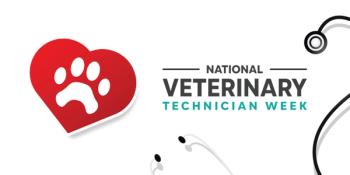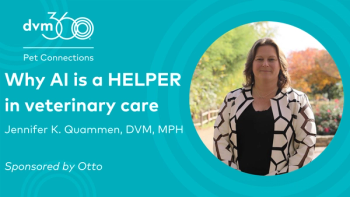
Always pay yourself first each month
Many years ago, I was called in to consult for a practice that was grossing at the time about $700,000.
Many years ago, I was called in to consult for a practice that was grossingat the time about $700,000.
Their problem, at the time, was simple. Their expenses for the same periodwere $735,000. Whatever they did, there was nothing but debt at the endof each month. There was no cash flow.
Clean house
In this instance, the problem had to do with a "we don't need diagnostics"attitude on the part of both associates and staff. The associates were babysittingthe practice and guessing at the pet's problem.
One older associate treated every condition with injections of penicillinand a steroid swirled together in the same syringe.
Overstaffing led to a take-it-easy attitude with everything being takencare of "tomorrow."
On my advice, the "two shot" doctor's contract was not renewedand attrition narrowed the staff down to a productive 18 percent of thegross revenues.
Everybody runs into problems sooner or later, but never can anythingbe allowed to interfere with cash flow, which can be likened to the fuelthat runs the practice vehicle. Without it, nothing runs!
One northeastern consulting client stated to me on arrival, "Mysalary will be the expense paid first and that's $150,000. It's your jobto find a way to earn enough to pay the other expenses."
No one had ever been that direct before, but there was nothing wrongwith that stratagem as long as the clients kept flowing, too.
Small business failures
The Small Business Development Center at Northern Kentucky Universityrecently published research on small business failures. It showed that "in1997, an amazingly high number (69 percent) of all U.S. businesses producedless than $50,000 a year, and 78 percent grossed less than $100,000."Wow! That puts veterinary practices in the top 22 percent of American businesses.
With 78 percent grossing less than $100,000, no wonder two out of threefail within the first five years. The study's author, Sutton Landry, concludedthat the primary way to solve cash flow problems was to avoid getting intodebt through borrowing. After borrowing, the leading cause of failure waslack of profitability and this is directly related to lack of managementknow-how.
The time for leftovers is the day after Thanksgiving, not on payday,when your family is depending on you for adequate funds to provide for theirneeds, current and future. Like that northeastern veterinarian, you needto hire yourself at a salary commensurate with your needs and pay yourselffirst. It is amazing how all else falls in place.
You are going to experience cash flow problems if:
Your staff doesn't have its act together at the front desk. Estimatesneed to be agreed upon by clients and all fees or payment plans must beattended to before the pet goes home.
You have this bigger, better complex that necessitates purchase of ultrasound,endoscopy, video, or laser devices when the profit on these devices cannotcover the payments. You can be the most sophisticated practice ever to filebankruptcy in your county. Any equipment that cannot pay for itself in additionalprofits each month is not to be considered.
Your overhead is padded by non-essential expenses. That floor cleaningservice is a luxury when staff is not fully occupied in patient care. Veterinarymedicine is and always has been "feast or famine." When it isslow, anyone can pick up a mop! Paper plates for the kennel are nice butwashing metal plates is not an ongoing supply problem. Looking at all theinvoices for a three-month period will always spot the fat that can be trimmedto fall to the bottom line.
Pharmacy
Many practitioners have too much cash tied up in their pharmacy. In thiscountry, there are few if any drugs that cannot be ordered and receivedin a few days.
Never buy more than a three-month supply of anything. As drug sales floatsaround 15 percent of sales, set yourself a budget of 15 percent of lastmonth's gross and no one, I repeat, no one should be allowed to exceed thatdrug budget each month.
On your own
There is no need to continue. You can take steps to control your cashflow yourself. Meet with your accountant or other financial advisor to calculateyour monthly break-even number. That's the amount you have to collect tocover your monthly expenses.
That's really the starting point. Now add in your salary and divide bythe number of clients you see in an average month. That's the average transactionfee you need to survive. Not a penny less will do!
Watch your practice by graphing that average transaction fee each month.Keep in mind the following formula:
My Salary = (Avg Transaction Avg transaction Expense)
x Number of transactions.
Newsletter
From exam room tips to practice management insights, get trusted veterinary news delivered straight to your inbox—subscribe to dvm360.






